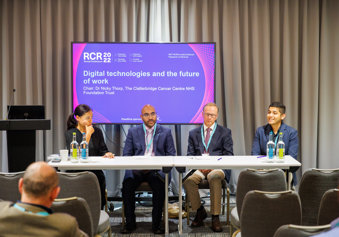School students
Clinical radiology
Radiology is a continuously evolving specialty involving the use of cutting-edge techniques. Becoming a radiologist puts you at the forefront of a fascinating field where you will work alongside like-minded individuals, playing a vital part in a multidisciplinary approach to patient treatment that spans all areas of medicine.
Clinical oncology
Oncology is a rewarding field of medicine that has seen tremendous advances in treatment and techniques over the past decade. It specialises in the treatment of cancer with drugs, including the commonly known chemotherapy and radiotherapy.
You will work as part of a vitally important team made up of key individuals in the hospital, including specialist nurses, radiographers, physicists, and chemotherapy nurses. The job incorporates a mix of ward work and clinics, allowing exposure to serious clinical problems as well as continuity of care and the opportunity to really get to know your patients and their families.
FAQs
-
A keen and eager mind
-
Attention to detail
-
Aptitude for problem-solving
-
An interest in imaging
-
Team working skills
-
Determination
-
A versatile and adaptable nature
Before becoming a specialist doctor, you will have to undertake five to six years at medical school, learning about all aspects of medicine. There are approximately 34 medical schools all over the UK, each with their own entry requirements and a slightly different curriculum that incorporates varying elements of all the medical specialties.
Before committing to apply for medical school it is important that you reflect on all the factors involved in your decision-making process:
-
Where do I want to study?
-
How will I finance my degree?
-
What kind of course is most appealing to me?
-
What are the entry requirements?
-
What A levels (or equivalent) do I need to have?
More information about how to apply for medical school and details on the process can be found at the Undergraduate Courses at University and College (UCAS) website and on the Medical Schools Council's dedicated pages.
Each medical school has its own curriculum that contains different options and modules for medical specialties. Therefore, there are some medical schools that will feature certain specialties more than others, and vice versa.
Career development
Our expert advice will guide you through all stages of your career, from choosing the right specialty, to offering support through professional networks.
